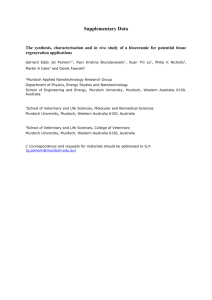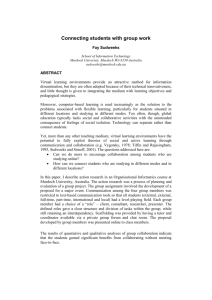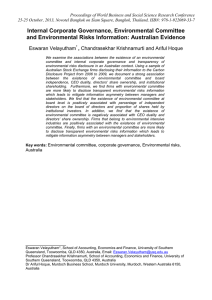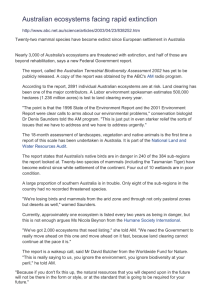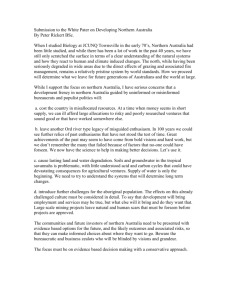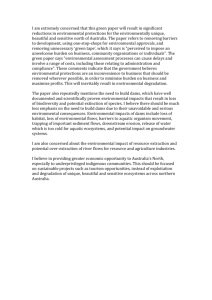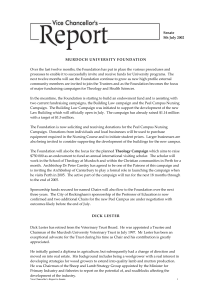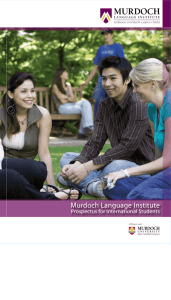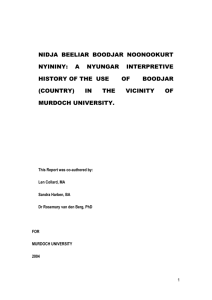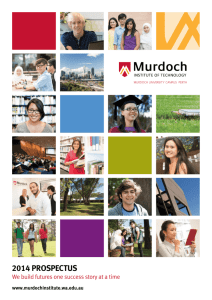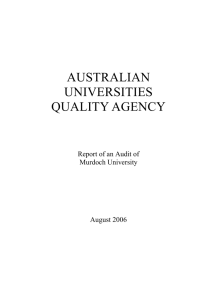Areas of Research Strength - Murdoch University Senate
advertisement
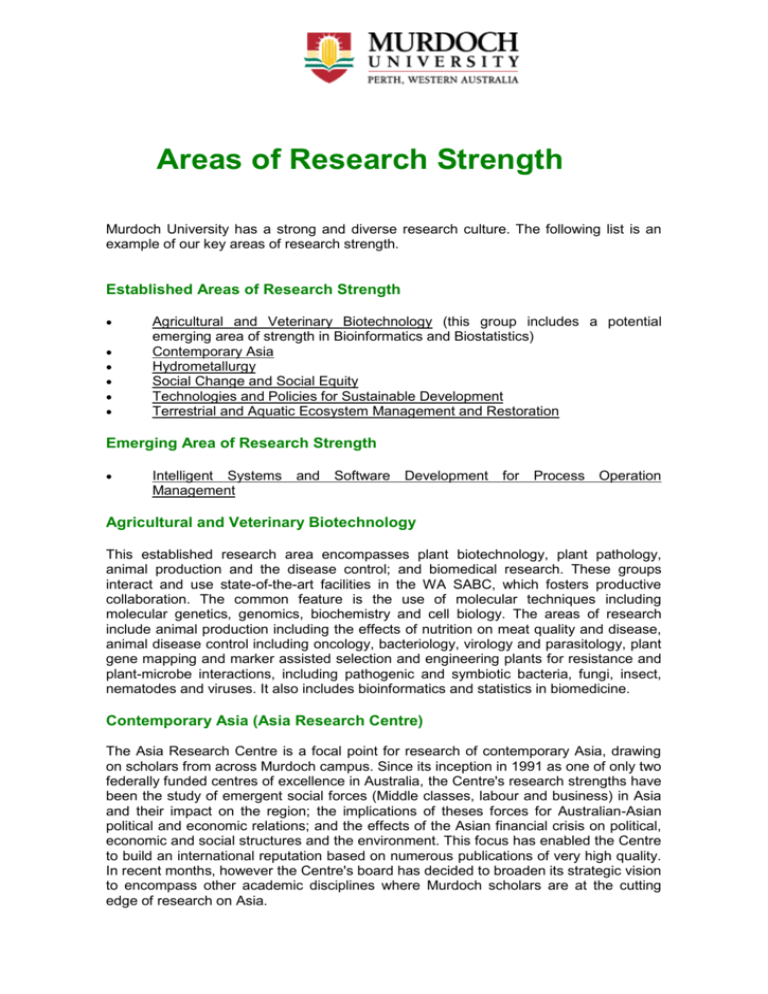
Areas of Research Strength Murdoch University has a strong and diverse research culture. The following list is an example of our key areas of research strength. Established Areas of Research Strength Agricultural and Veterinary Biotechnology (this group includes a potential emerging area of strength in Bioinformatics and Biostatistics) Contemporary Asia Hydrometallurgy Social Change and Social Equity Technologies and Policies for Sustainable Development Terrestrial and Aquatic Ecosystem Management and Restoration Emerging Area of Research Strength Intelligent Systems Management and Software Development for Process Operation Agricultural and Veterinary Biotechnology This established research area encompasses plant biotechnology, plant pathology, animal production and the disease control; and biomedical research. These groups interact and use state-of-the-art facilities in the WA SABC, which fosters productive collaboration. The common feature is the use of molecular techniques including molecular genetics, genomics, biochemistry and cell biology. The areas of research include animal production including the effects of nutrition on meat quality and disease, animal disease control including oncology, bacteriology, virology and parasitology, plant gene mapping and marker assisted selection and engineering plants for resistance and plant-microbe interactions, including pathogenic and symbiotic bacteria, fungi, insect, nematodes and viruses. It also includes bioinformatics and statistics in biomedicine. Contemporary Asia (Asia Research Centre) The Asia Research Centre is a focal point for research of contemporary Asia, drawing on scholars from across Murdoch campus. Since its inception in 1991 as one of only two federally funded centres of excellence in Australia, the Centre's research strengths have been the study of emergent social forces (Middle classes, labour and business) in Asia and their impact on the region; the implications of theses forces for Australian-Asian political and economic relations; and the effects of the Asian financial crisis on political, economic and social structures and the environment. This focus has enabled the Centre to build an international reputation based on numerous publications of very high quality. In recent months, however the Centre's board has decided to broaden its strategic vision to encompass other academic disciplines where Murdoch scholars are at the cutting edge of research on Asia. The work of the centre is now focussed on seven key interdisciplinary research projects. These projects are: telecommunications in the region; reverse migration; governance and capacity-building (which includes the traditional areas of research strength); environmental and population; culture, socialisation and national identity; community, environment and law; and animal diseases and their human consequences. Hydrometallurgy This group focuses on the unit operations and processes for the leaching, separation by ion-exchange and solvent extraction, electro-winning and refining, and environmental remediation in the field of hydrometallurgy. The research focus has been well established and includes most, but not all, aspects of hydrometallurgy. It is undoubtedly the largest academic group involved in hydrometallurgical teaching and research in the Western world. The activities of the group are such that there is no real duplication of effort. On the contrary the group consists of a loosely knit conglomerate of complementary skills which can span activities from fundamental aspects of thermodynamics and kinetics of hydrometallurgical reactions to actual pilot-plant test work on sites. With one or two minor exceptions, the group is capable of tackling most problems and exploring opportunities across a wide spectrum of commodities. Social Change and Social Equity This major research initiative is concerned with the social and psychological problems that follow major social, economic and technological change, specifically the processes whereby major sections of society may be deprived of resources due to psychological and social biases which may interfere with the understanding and identification of problems associated with the adjustment of those sections to change. Change effects the processes of distributing resources to significant and disparate groups within the community, dealing with different priorities and justifications for allocation. This research targets a number of specific issues. These are first, the social and psychological processes of discrimination on the grounds of race and gender together with aspects of equality and multiculturalism and the act of changing cultural awareness of indigenous issues. This also subsumes the issues inherent with social justice accorded to people with disabilities. Second, it is concerned with the identification of the changes in community which accompany ageing and the facilitation of the need to maintain such a health ageing population. Finally, we are concerned with the consequences for the community of the significant movement of permanent migrants dues to social and global change, together with the consequences for education of significant numbers of international students in global economy. Technologies and Policies for Sustainable Development Sustainable development is a process that involves research, development and implementation of new technologies to meet the needs of society without compromising the needs of future generations to meet their needs. This process ensures that new technologies are economically viable and also that they simultaneously bring social and environmental benefits. This area is of crucial international importance as the world struggles to overcome problems caused by population growth, inefficient and polluting industrial processes and unsustainable consumption of resources. Sustainable development seeks to reduce such impacts while improving the economy and quality of life. Murdoch University has a long history of involvement in this field and has four active research groups working on various aspects. These groups work closely together on major projects and interact regularly on research and teaching projects. In the future these groups will formalise and coordinate their operations in order to enhance the University's capacity to bid for major projects in the area of sustainable development, in the international, national and local market. Terrestrial and Aquatic Ecosystem Management and Restoration The core function of this group is the generation of basic and strategic science and technology relevant to the maintenance and repair of ecosystems and their components, and the sustainable development of natural resources in the western regions of Australia, and their future applications in other parts of the world. Western Australia encompasses regions of the highest biodiversity on the continent and, indeed, on the planet. The State also has very extensive mining, petrochemical, agriculture, forestry and fisheries industries that supply large components of Australia's overseas earnings. Development of the region's renewable natural resources in a sustainable way and the maintenance and repair of its natural and managed ecosystems is essential to the long-term prosperity of the region. Lessons learned in Western Australia can also be transferred of modified in other regions of Australia and internationally. Murdoch University has a very substantial research effort directed at supplying the basis and strategic science required for this endeavour, and its work on diverse and unique ecosystems has both national and global significance. The research grouping allows for integration across systems and disciplines. Western Australia represents a unique natural laboratory, in which issues of development and sustainability come into sharp focus against a flora, fauna and other natural resources of global significance. Intelligent Systems and Software Development for Process Operation Management The group brings together experts from three areas (Process Control, Pattern Recognition/Machine Learning/Computer Vision, and Software Engineering), with an aim to pool the expertise to solve complex industrial problems, which cannot be solved by either sub-discipline in isolation. Our aim is to research and develop methodologies and on-line tools/software that support the following in the process industry: Automatic detection of poorly performing application by providing information for checking if performance targets are being met by the controlled process variable (ie maintenance of control loops). Automatic detection of abnormal process situations as soon as they arise and tools to aid in the problem diagnosis. Prioritisation of control problems and aid process operators in carrying out the remedial actions. Analysis of sensors that use vision that has not been incorporated in process plants until now. Formal methods for process control. Risk analysis for designing, managing and maintaining new technologies.
